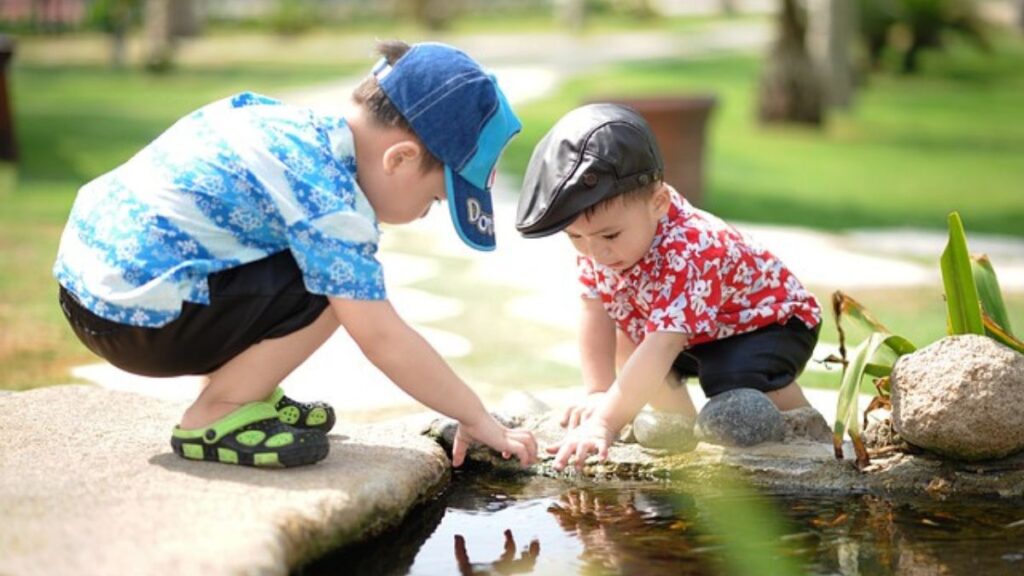Introduction:
“Unlocking the Kingdom: Embracing Children’s Role in Heaven’s Domain”

In the narrative of spiritual teachings, children often symbolize purity, innocence, and a special connection to the divine. The phrase, “Let the children come to me. Do not forbid them for the kingdom of heaven is theirs,” resonates profoundly in many religious and philosophical traditions. In this article, we delve into the significance of children in the context of heaven’s domain, exploring their unique role and the lessons they offer to adults.
“What does it mean to embrace children’s role in heaven’s domain?”
Understanding Children’s Role in Spiritual Narratives: Children hold a sacred place in spiritual teachings worldwide. Their innocence and openness to the world are often regarded as qualities to emulate in one’s spiritual journey. From Christianity to Buddhism, various traditions emphasize the importance of embracing childlike qualities such as curiosity, wonder, and trust in the divine.
The Kingdom of Heaven: A Concept of Inclusivity and Wholeness: The concept of the “kingdom of heaven” transcends religious boundaries, representing a state of harmony, love, and unity with the divine. Children, with their pure hearts and untainted spirits, are seen as natural inhabitants of this kingdom. Their presence reminds us of the inclusivity and unconditional love that characterize heaven’s domain.
Lessons from Children: Children possess innate wisdom that often eludes adults. Their ability to live in the present moment, express unconditional love, and find joy in simple pleasures serves as a powerful reminder of what truly matters in life. By observing and learning from children, adults can cultivate a deeper connection to the divine and experience greater fulfillment on their spiritual paths.
Nurturing the Spiritual Growth of Children: As stewards of the next generation, adults play a crucial role in nurturing the spiritual growth of children. By providing them with love, guidance, and encouragement, adults can help children cultivate their innate spirituality and develop a strong connection to the divine. Through rituals, storytelling, and meaningful interactions, adults can instill spiritual values that will guide children throughout their lives.
“Are there universal qualities children possess that connect them to heaven?”

The concept of universal qualities connecting children to heaven is often rooted in spiritual or religious beliefs across various cultures and traditions. While these qualities may vary somewhat depending on cultural and religious perspectives, some common themes include:
- Innocence: Children are often seen as pure and innocent, untainted by the complexities and burdens of adult life. This innocence is believed to be a reflection of a state of grace or closeness to the divine.
- Trust and Faith: Children typically possess a natural trust and faith, both in the people around them and in the unseen forces of the universe. This unwavering trust is often viewed as a reflection of a deeper spiritual connection.
- Wonder and Curiosity: Children approach the world with a sense of wonder and curiosity, seeing magic and beauty in the simplest of things. This openness to awe and exploration is often seen as a reflection of a deeper spiritual awareness.
- Love and Compassion: Children are often naturally loving and compassionate, expressing empathy and kindness towards others without judgment or reservation. This capacity for unconditional love is seen as a reflection of divine love and grace.
- Simplicity: Children typically live in the present moment, unburdened by regrets of the past or worries about the future. Their simplicity of being is often viewed as a reflection of a deeper spiritual truth about the nature of existence.
These universal qualities are often cited as evidence of children’s special connection to heaven or the divine, and they serve as a source of comfort and inspiration for those who believe in the sanctity of childhood and the afterlife.
“How can parents and caregivers support children’s connection to the divine?”
Supporting children’s connection to the divine can be approached in various ways, depending on individual beliefs and values. Here are some general suggestions for parents and caregivers:

- Provide Spiritual Guidance: Introduce children to spiritual practices and beliefs that align with your family’s values. This could involve teaching them prayers, meditation techniques, or stories from religious texts that illustrate moral and spiritual lessons.
- Encourage Questions and Exploration: Create an environment where children feel comfortable asking questions about spirituality and exploring their beliefs. Encourage curiosity and open-mindedness while providing age-appropriate answers and guidance.
- Lead by Example: Demonstrate your own spiritual practices and beliefs through your actions and behaviors. Children often learn by observing adults, so modeling qualities such as kindness, compassion, forgiveness, and gratitude can have a profound impact on their spiritual development.
- Foster Connection with Nature: Encourage children to spend time in nature and appreciate the beauty and wonder of the natural world. Many spiritual traditions emphasize the connection between nature and the divine, so spending time outdoors can help children feel a sense of awe and reverence.
- Promote Service and Kindness: Engage children in acts of service and kindness towards others. Teaching them the importance of empathy, compassion, and helping those in need fosters a sense of connection to something greater than themselves.
- Create Sacred Spaces: Designate a space in your home where children can engage in quiet reflection, prayer, or meditation. This could be a simple altar with meaningful objects or symbols from your spiritual tradition, providing a physical reminder of the divine presence.
- Encourage Gratitude: Teach children to cultivate a sense of gratitude for the blessings in their lives. Encourage them to express gratitude through prayers, journaling, or simple rituals, fostering a deeper appreciation for the gifts of the divine.
- Respect Individual Beliefs: Recognize and respect that children may have their own unique spiritual experiences and beliefs. Allow them the freedom to explore and develop their own relationship with the divine, even if it differs from your own beliefs.
By incorporating these practices into daily life, parents and caregivers can nurture children’s spiritual growth and support their connection to the divine in ways that are meaningful and enriching.
Conclusion:
“Let the children come to me. Do not forbid them for the kingdom of heaven is theirs” serves as a timeless reminder of the sacredness of childhood and the profound wisdom that children embody. By embracing children’s role in heaven’s domain, we can deepen our spiritual understanding, cultivate greater compassion, and create a world that reflects the harmony and love of the divine kingdom. As we journey forward, may we always remember the invaluable lessons that children teach us and strive to embody their purity, innocence, and unwavering faith in the goodness of the universe.
This article explores the profound significance of children in spiritual teachings, emphasizing their role in heaven’s domain and the lessons they offer to adults. By embracing children’s innate spirituality and wisdom, we can cultivate a deeper connection to the divine and create a world that reflects the harmony and love of the kingdom of heaven.
Frequently Asked Questions:
Q1: Why are children often associated with the kingdom of heaven?
Children are often regarded as symbols of purity, innocence, and openness to the divine. In many spiritual traditions, they represent the qualities necessary to enter the kingdom of heaven, such as humility, trust, and love.
Q2: What lessons can adults learn from children in the context of spirituality?
Children offer valuable lessons in living in the present moment, expressing unconditional love, and finding joy in simplicity. By observing and learning from children, adults can cultivate qualities such as curiosity, wonder, and faith in the divine.
Q3: How can adults nurture the spiritual growth of children?
Adults can nurture children’s spiritual growth by providing them with love, guidance, and opportunities for reflection and exploration. Rituals, storytelling, and meaningful interactions can all help instill spiritual values and deepen children’s connection to the divine.
References:
- Matthew 19:14 – “Jesus said, ‘Let the little children come to me, and do not hinder them, for the kingdom of heaven belongs to such as these.'”
- Mark 10:14 – “When Jesus saw this, he was indignant. He said to them, ‘Let the little children come to me, and do not hinder them, for the kingdom of God belongs to such as these.'”
- Luke 18:16 – “But Jesus called the children to him and said, ‘Let the little children come to me, and do not hinder them, for the kingdom of God belongs to such as these.'”
- Thich Nhat Hanh, “Teachings on Love” – Thich Nhat Hanh, a renowned Buddhist monk, emphasizes the importance of cultivating childlike qualities such as openness, joy, and compassion in one’s spiritual practice.
- “The Tao Te Ching” by Lao Tzu – This ancient Chinese text contains teachings on the virtue of simplicity, which resonate with the childlike wisdom often celebrated in spiritual traditions.
- “The Prophet” by Kahlil Gibran – Gibran’s poetic work explores themes of love, spirituality, and the innocence of childhood, offering insights into the deeper meanings behind Jesus’ teachings on children.
- “The Inner Child Workbook” by Cathryn L. Taylor – This workbook provides practical exercises and insights for adults seeking to reconnect with their inner child and tap into its wisdom for spiritual growth.






